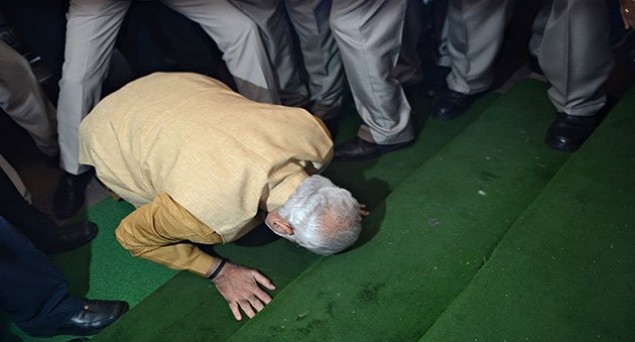By IndiaTomorrow.net,
New Delhi, 26 Dec 2014: The BJP-led government of Prime Minister Narendra Modi is violating parliamentary democracy by passing key economic policy issues through ordinance route and skipping the laid down provisions, the Left parties have alleged. Rajya Sabha did not pass the Insurance Law Amendment Bill which will increase FDI from 26% to 49% in insurance sector and the Coal Mines Bill was not even introduced in Rajya Sabha.
Two prominent Left parties – the CPI and CPI-M have appealed to President Pranab Mukherjee to reject the ordinances and asked the people to protest against ‘Ordinance Raj’ and FDI in key sectors.
The Communist Party of India came down heavily on the NDA government on the Insurance Law (Amendment Bill) and re-promulgation of an ordinance on the process to auction of 24 coal mines.
“The method of so-called reforms ‘to boost confidence among investors’ as claimed by the Finance Minister Arun Jaitley is unethical and undermining the Parliamentary institutions. The contents of both the ordinances go against the interests of the nation,” the Communist Party of India said in a statement.
“The President of India is the custodian of our Constitution in whom is vested ‘the executive power of the union’ (Article 53). In discharge of this responsibility I am seeking your intervention to ensure that the established Parliament procedures are not violated undermining our Parliamentary democracy. More than anybody else, with your long experience and vast knowledge of the Rules of both houses of Parliament, I believe, that you are the most competent authority to intervene and protect the sanctity of our Constitution and Parliamentary democracy,” Yechury said in a letter to Mukherjee.
Talking to IndiaTomorrow.net CPI-M leader Sitaram Yechury said that the move of the government “constitutes a grave violation of the conduct of business in the Houses of Parliament, under the accepted Rules”.
In the recently concluded Winter Session of Parliament, (third Session of 16th Lok Sabha) a total of 16 legislations (Bills) were taken up. An unprecedented 13 of these were passed without being referred to and scrutinized by the Parliamentary Standing Committees. He termed this practice as the brutal exercise of the “tyranny of democracy”.
In the Rajya Sabha, the Select Committees were constituted to examine three such bills, passed by the Lok Sabha.
The Lok Sabha Rule 75(2a) states that “if the member in charge moves that the Bill be taken into consideration any member may move as an amendment that the Bill be referred to a Select Committee of the House, or a Joint Committee of the Houses with the concurrence of the Council, or be circulated for the purpose of eliciting opinion thereon by a date to be specified in the motion”.
Such Rules are no longer being respected through the exercise of ‘brute majority’. Bills are being adopted even in the midst of a din. Yechury sought the intervention of the president to “ensure that such violation of Parliamentary Procedures is not permitted. Unless otherwise specified in the Rules or under extraordinary circumstances no legislative bill should be exempt from being scrutinized thoroughly by the Parliamentary Standing Committees”.
It was being widely reported in the media that the Government is seeking to take recourse to the ‘Ordinance Route’, particularly on two important Bills –raising FDI ceiling in Insurance and on coal block allocations. This is because the Government could not muster a majority in the Rajya Sabha.
A Select Committee of the Rajya Sabha scrutinized the Insurance Bill. Its report has been tabled in the House but not yet deliberated upon. It, hence, remains the property of the House on which a decision is pending.
The CPI-M said that “until this process is completed, the issuance of an Ordinance would be a grave violation of the sanctity of Parliamentary proceedings”.
“I am sincerely requesting you not to sanction such ordinances,” Yechury said in his letter to the President.
Taking recourse to such an ‘Ordinance Route’ under these circumstances would be a clear violation of our established Parliamentary Democracy. “I am sincerely requesting you to intervene in order to ‘nip in the bud’ such tendencies which may result in imposing an authoritarian manner of parliamentary functioning. This would be completely antithetical to the letter and spirit of our constitutionally established Parliamentary Democracy,” he said.
The way the government is trying to bypass parliament on key economic issues and fiscal policies amply reflects symptoms of growing influence of crony capitalism. Speaking to NDTV RBI chief Raghuram Rajan said: “There are concerns about crony capitalism. Crony capitalism is a phase that every country has to go through. We have plenty of good business people in India. What is worrying about a few people muddying the pool and making it difficult for everybody else.”





